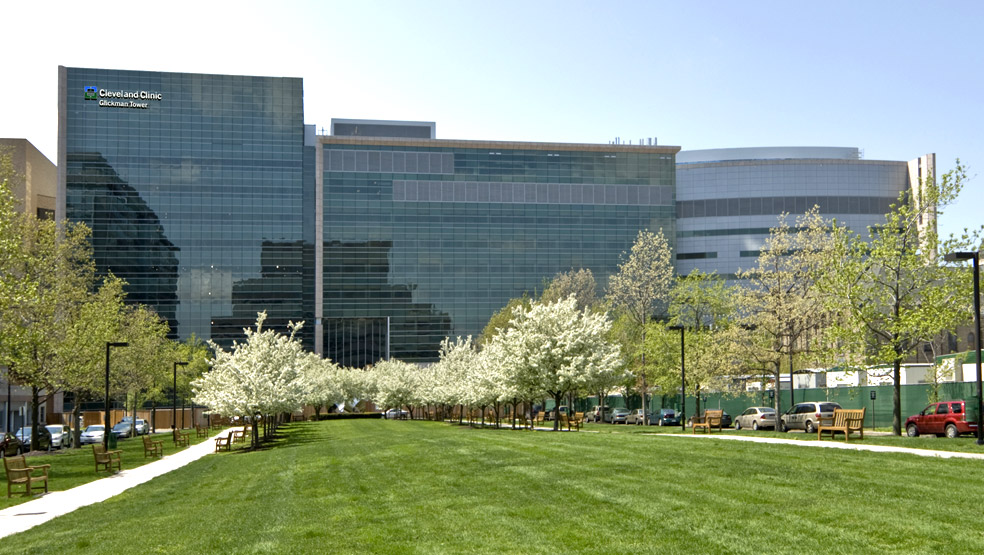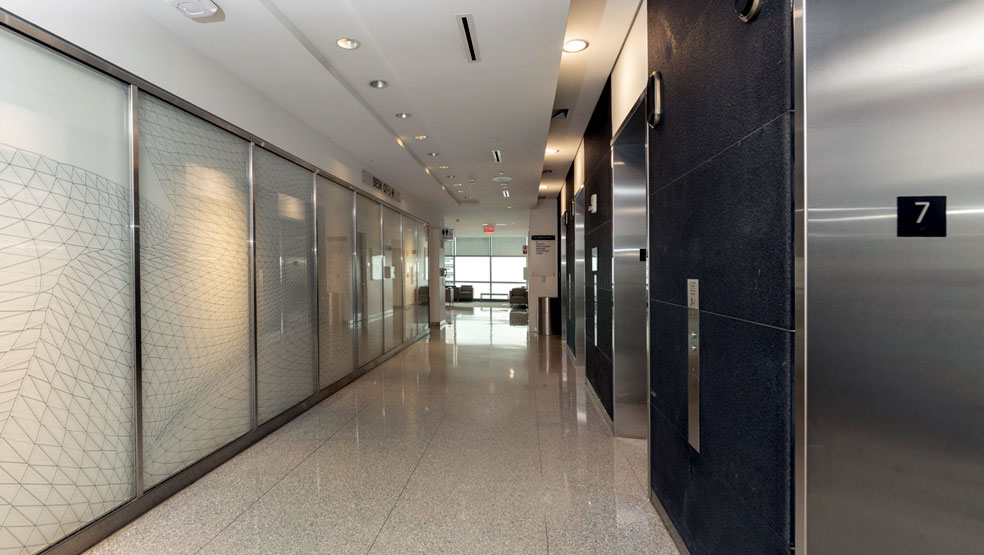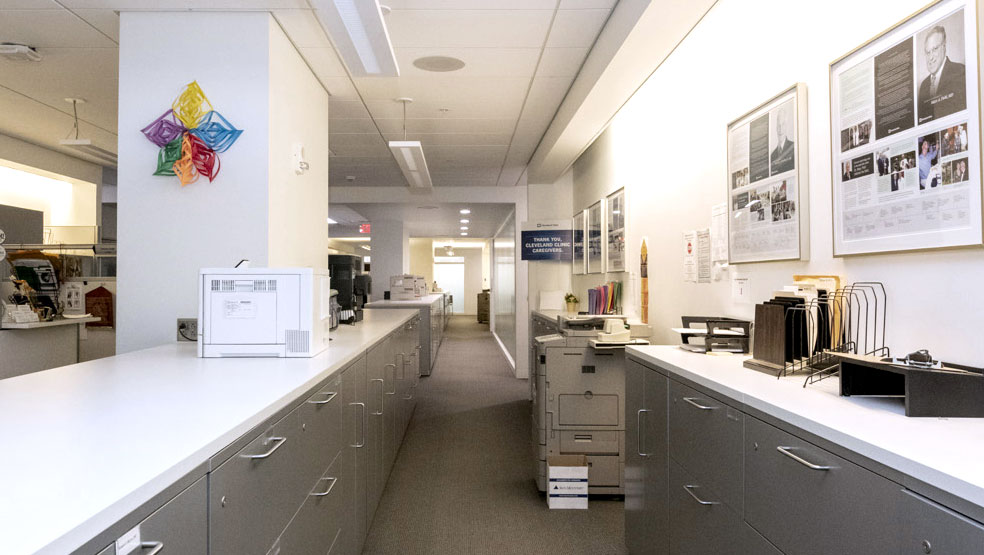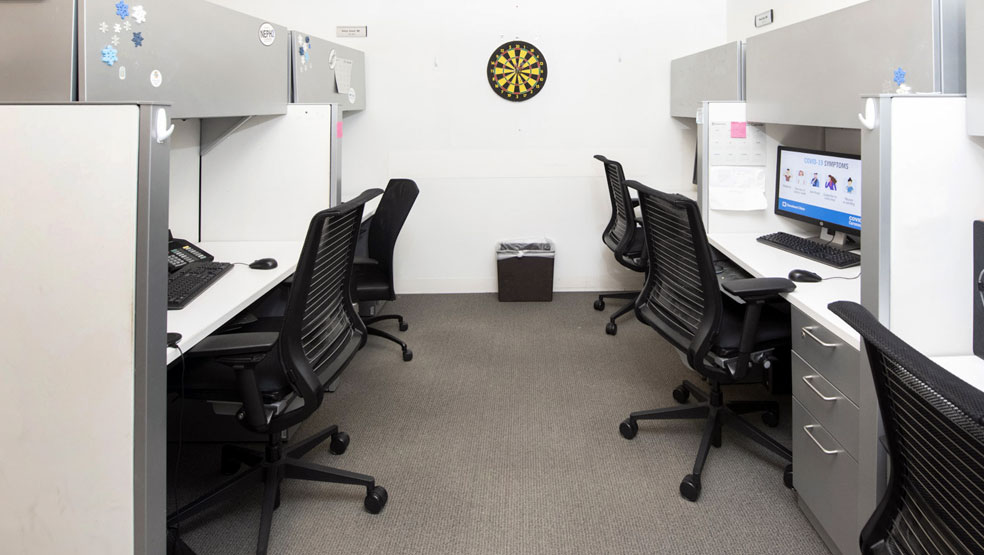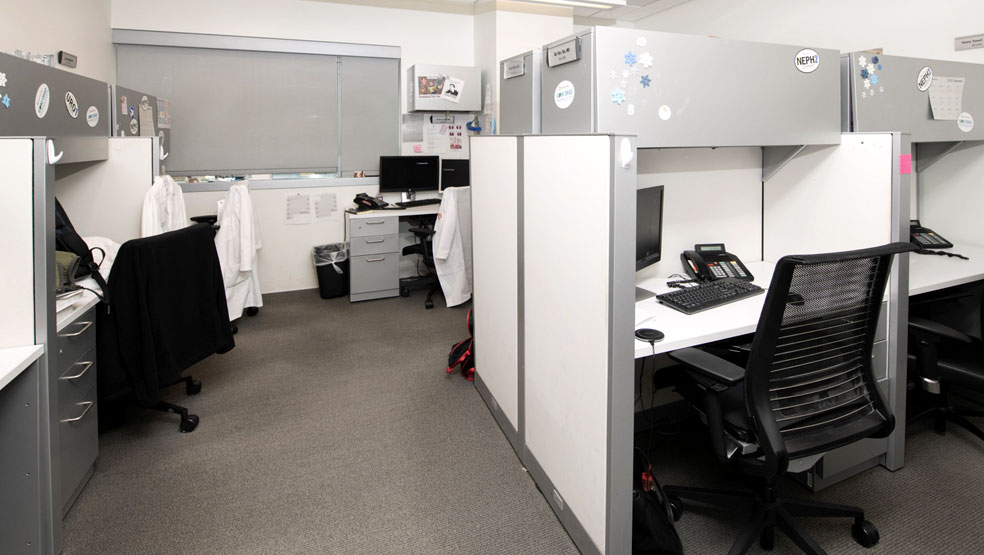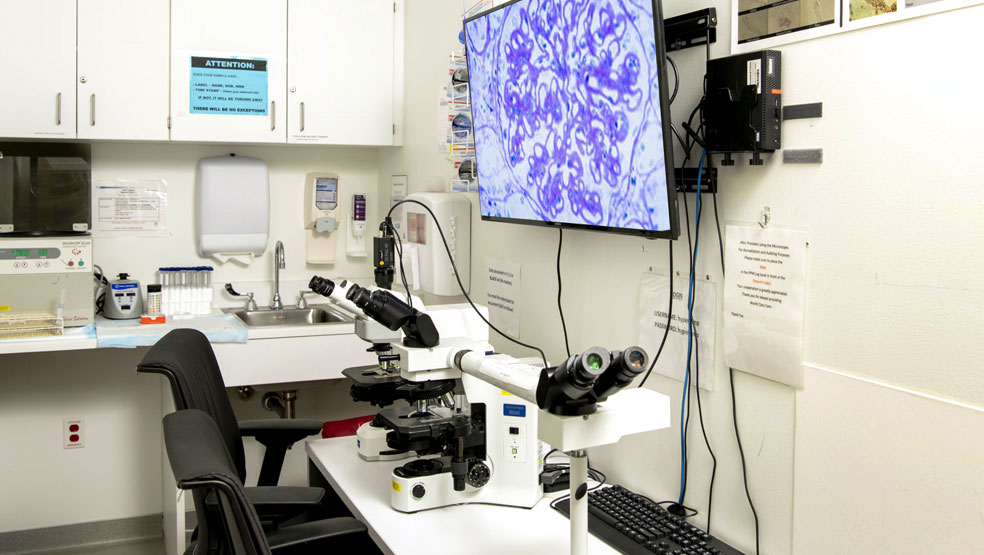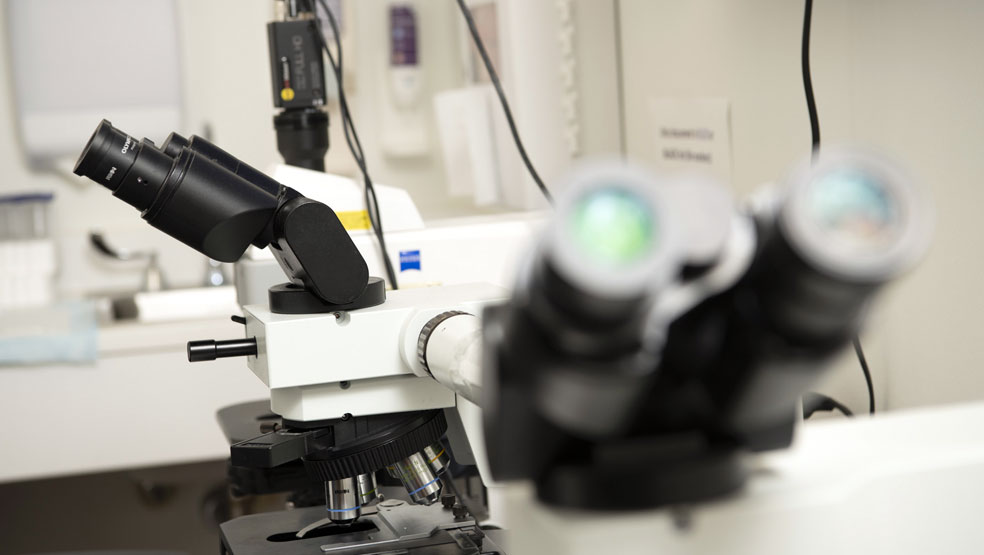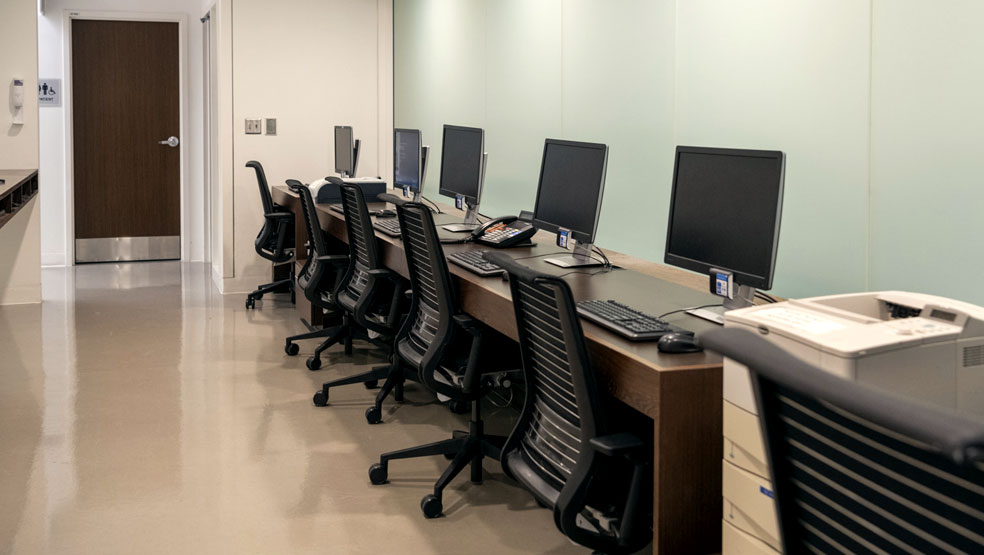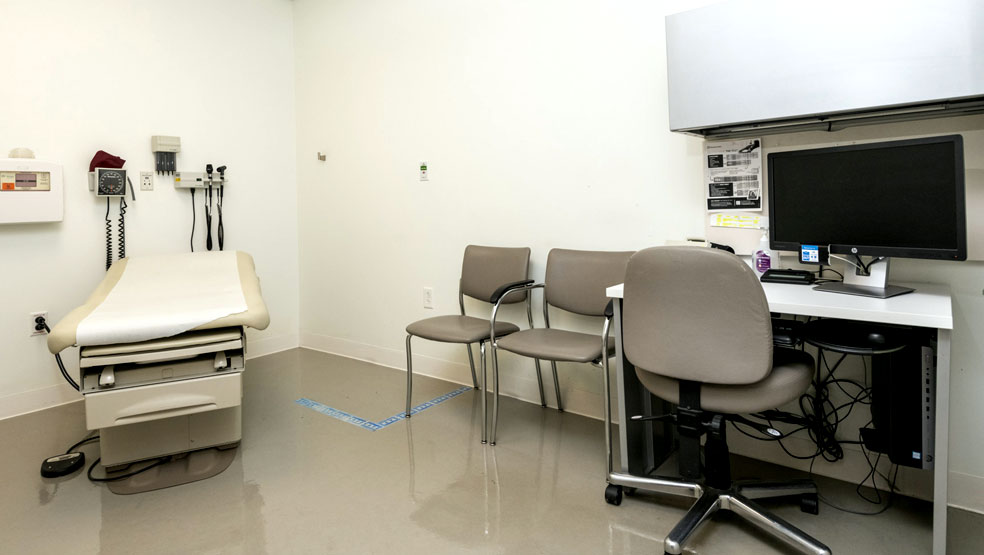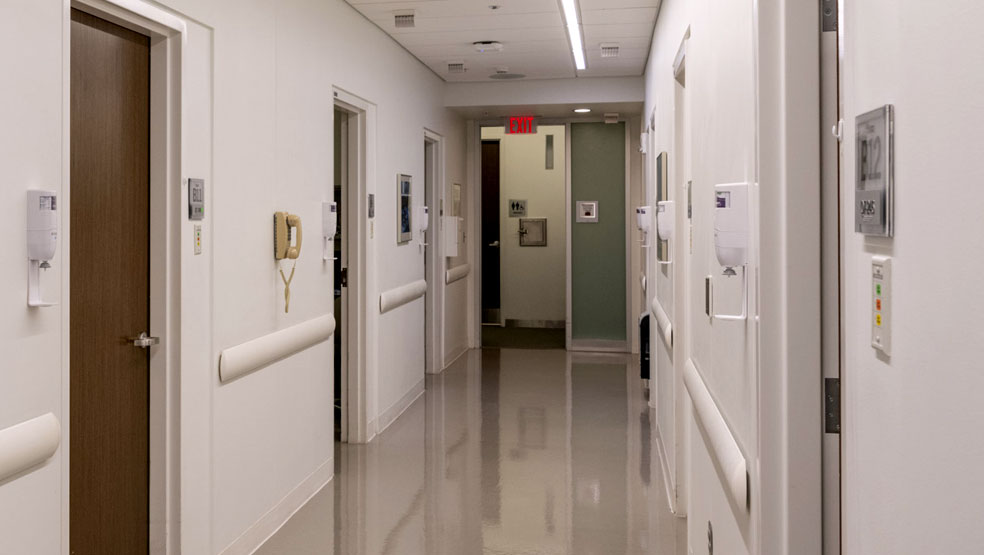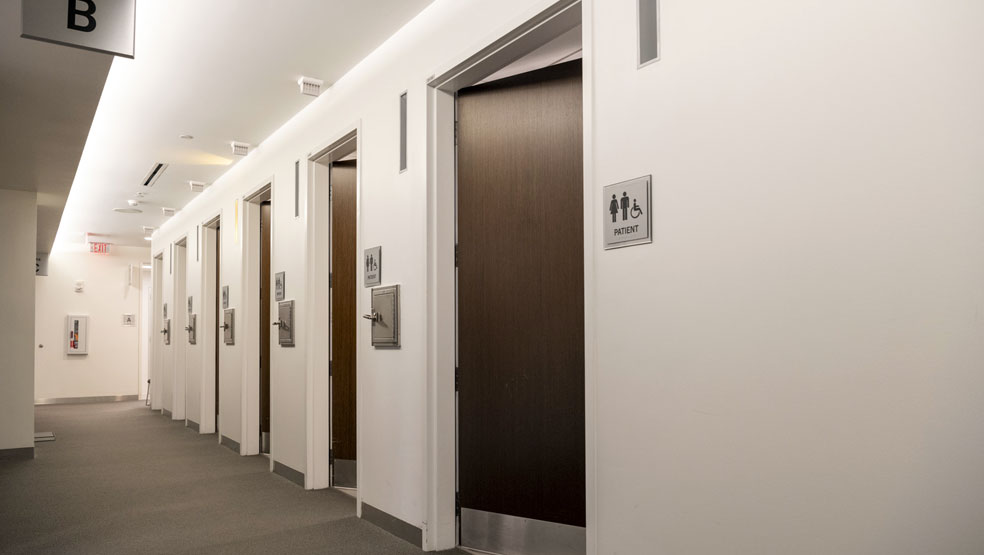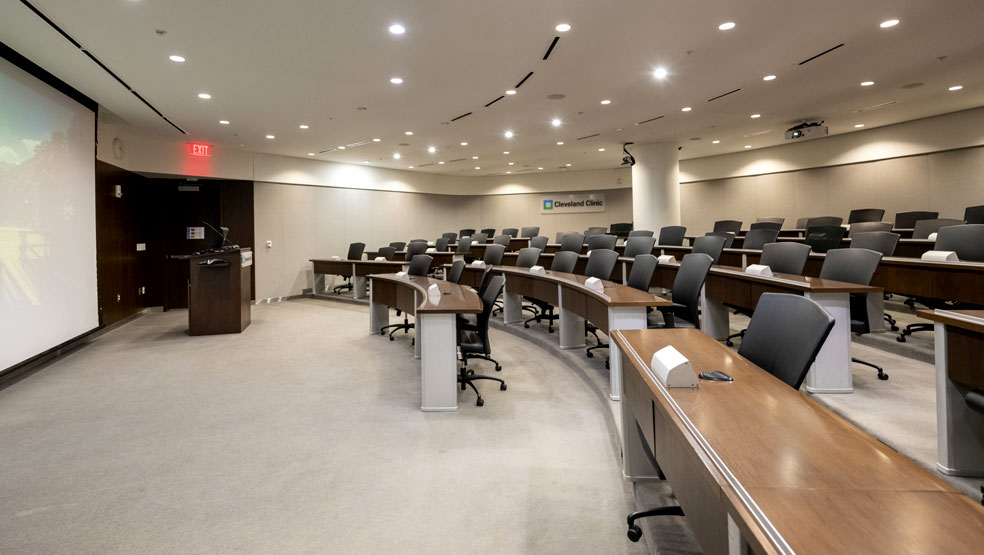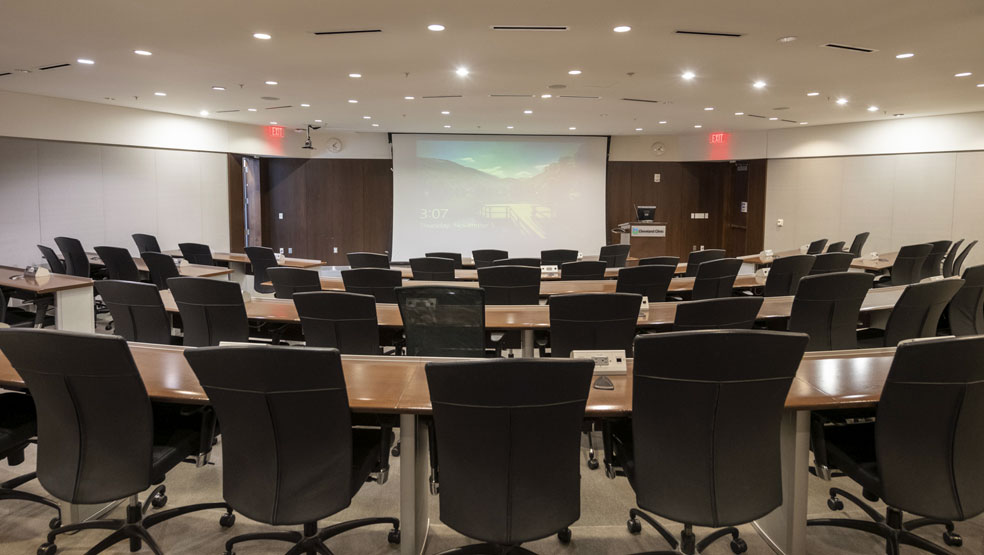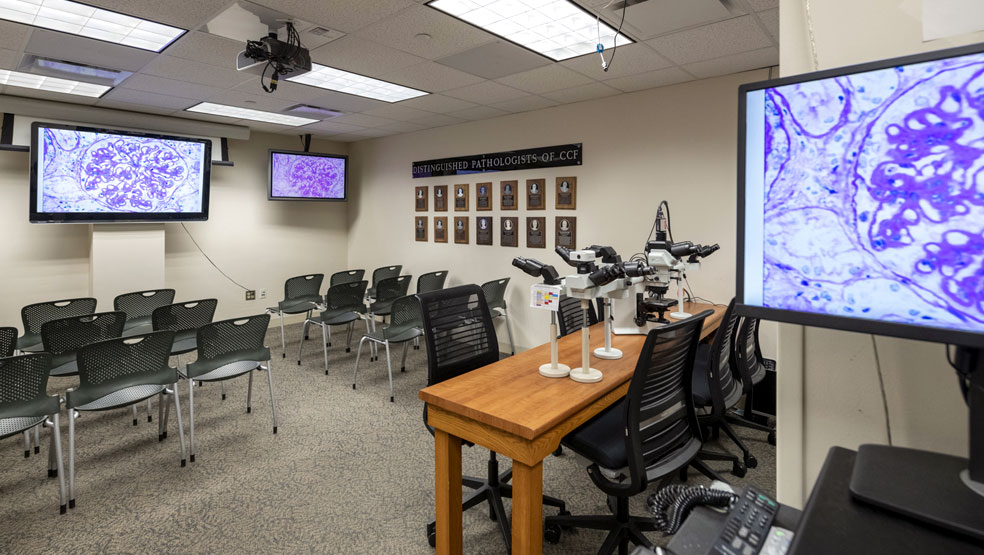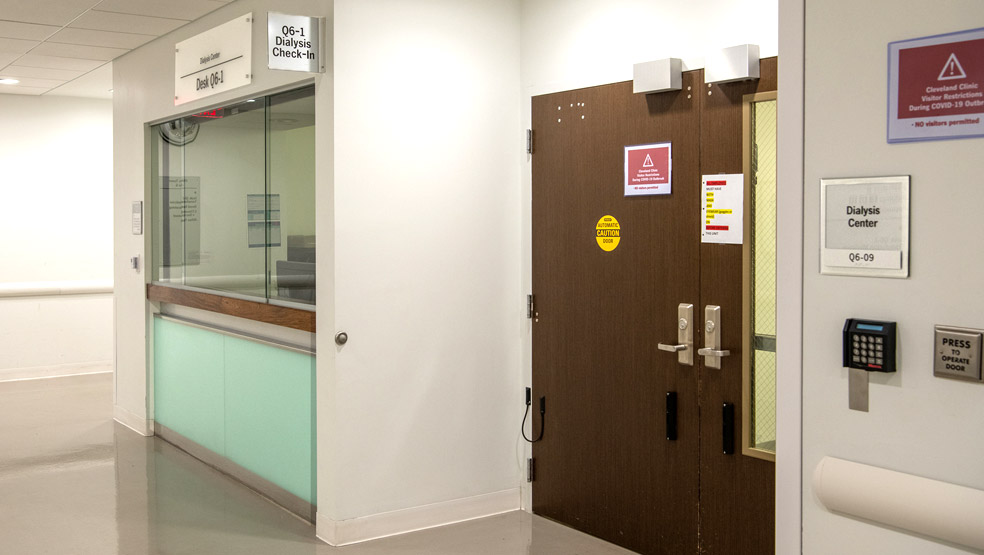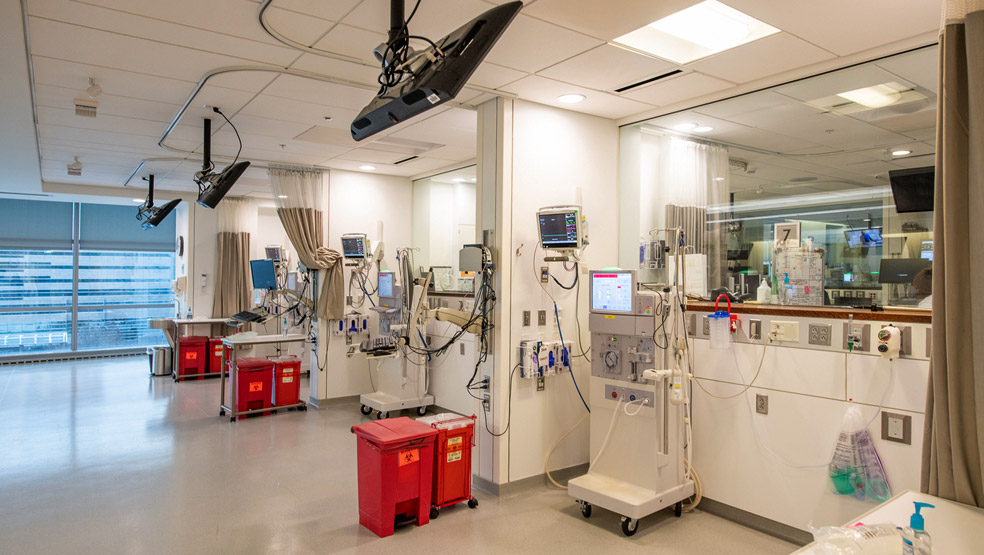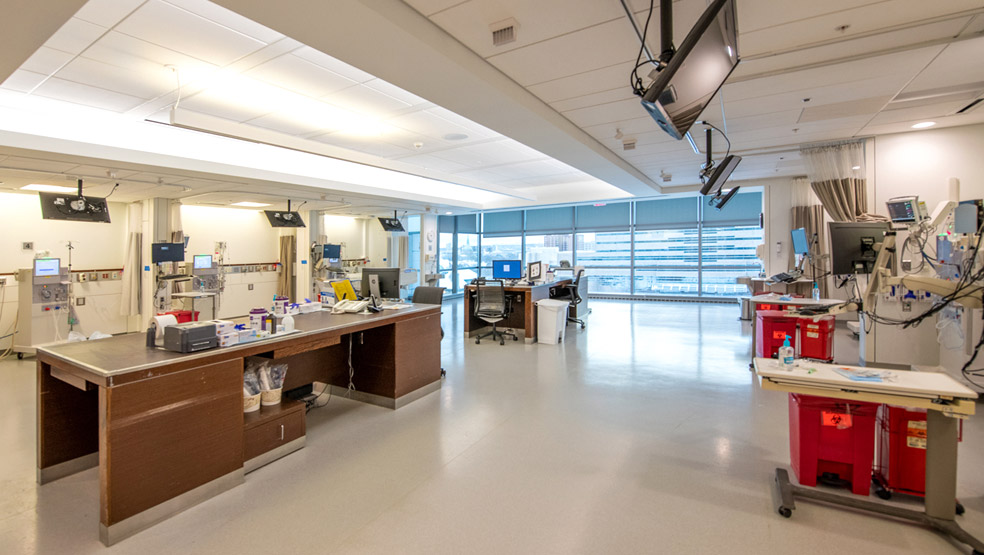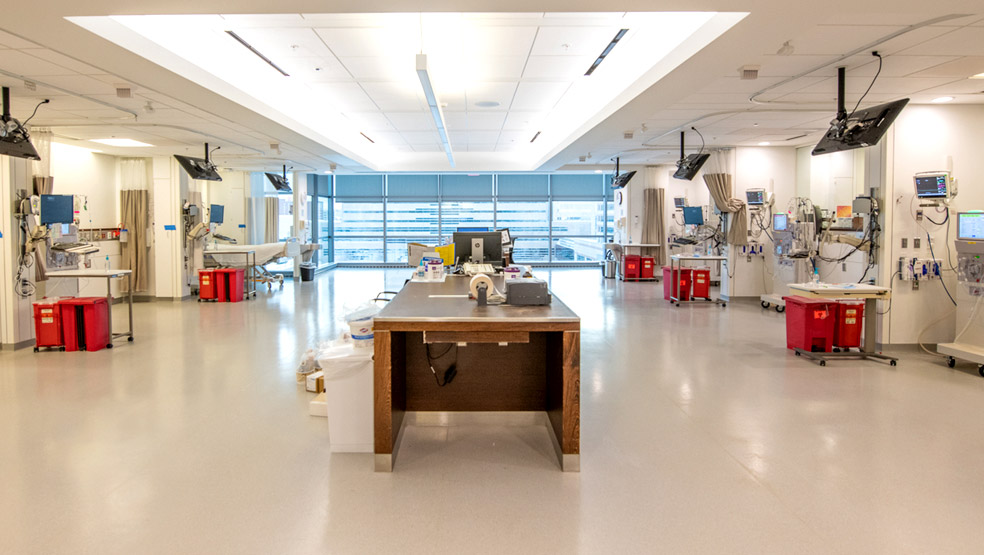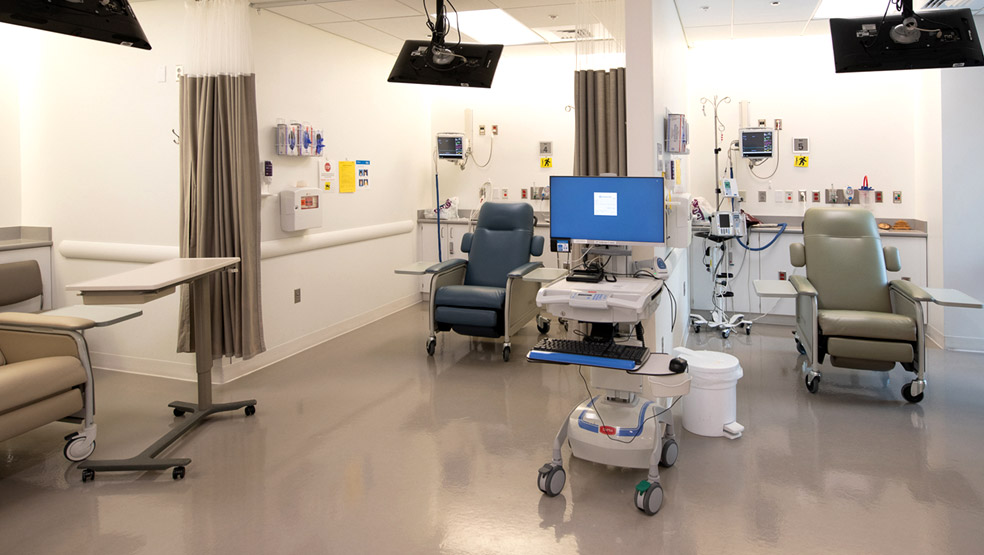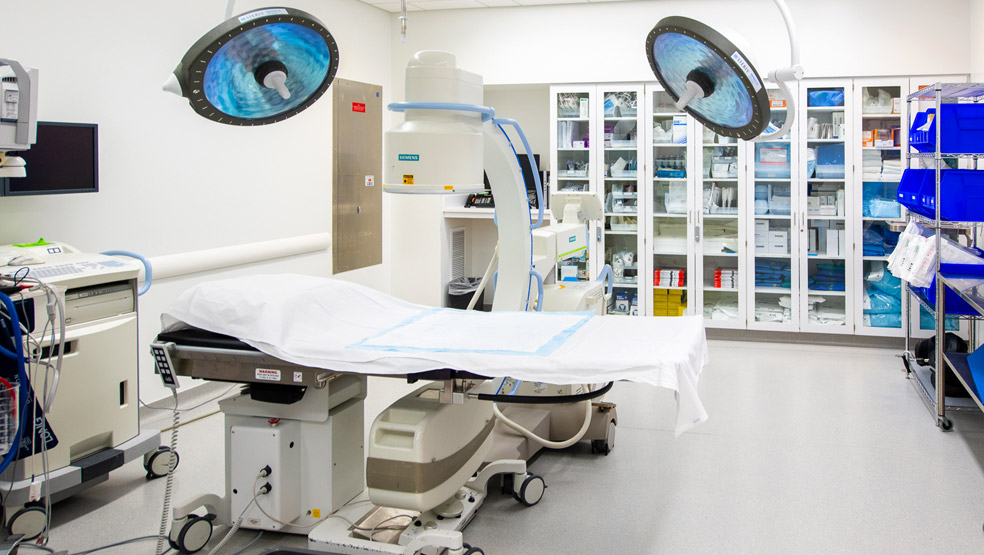Welcome
Thank you for your interest in Cleveland Clinic’s Nephrology and Hypertension Fellowship Program. As the Program Director, I am confident our innovative curriculum will provide you with an optimal training environment to be successful nephrologists in academia, clinical, and subspecialty training. We offer a two-year ACGME accredited training program with opportunities in an American Society of Transplantation (AST) fellowship and a NIH funded U2C Training grant for those interested in additional years of research.
The fellowship had an incredible year in 2025. I am proud to announce that we successfully recruited 5 outstanding fellows to fill the class of 2026. We have a popular HOME night float system, a limited weekend call schedule (Q5), expanded our interventional nephrology experience, added another transplant fellow position, and fostered a clinical and research collaboration with the Louis Stokes Cleveland VA. Our fellows pursued scholarly activities by presenting at many national nephrology meetings, participating in recognized nephrology workgroups, publishing in high impact journals and involvement in the Cleveland Clinic Lerner College Medical school.
The Department of Kidney Medicine has a rich legacy of excellence in patient care, clinical research and fellow education. Cleveland Clinic is globally recognized for its model of healthcare, vast expertise and exceptional patient care.
Enjoy this aerial video of Cleveland Clinic's Glickman Tower and Main Campus.
Virtual Tour of the Nephrology and Hypertension Department
1 of 21-
Q Building- Glickman Tower. The tallest building on the Cleveland Clinic main campus houses the Glickman Urological and Kidney Institute offering urology and nephrology services.
-
Entering the Nephrology and Hypertension Department on the 7th Floor of the Glickman Tower (Q7 building)
-
Administrative area of the Nephrology and Hypertension Department
-
Nephrology Fellows Private Room and Workspace
-
Nephrology Fellows Desk Workspace
-
Q7 Conference Room
-
Q7 CLIA Approved Urine Lab
-
Q7 Urine Lab multiheaded microscope
-
Q7 Ambulatory Clinic Workspace
-
Q7 Ambulatory Clinic Room
-
Q7 Ambulatory Clinic Hall which leads to the workspace and room
-
Q7 Ambulatory Clinic Hall which leads to the patient rooms
-
Q1-300 Department Conference Room - Side View
-
Q1-300 Department Conference Room - Entrance View
-
Medical Kidney Pathology Lab
-
Q6 Dialysis Unit (21 stations, 2 isolation rooms)
-
Q6 Dialysis Unit (21 stations, 2 isolation rooms)
-
Q6 Dialysis Unit (North Side)
-
Q6 Dialysis Unit (South Side)
-
Q9 Renal Infusion Lab (6 chairs)
-
Q9 Interventional Nephrology Suite
About the fellowship
The nephrology fellowship is the foundation of our department. We pride ourselves in our ability to attract highly qualified, academically curious applicants who believe in the six core values of Cleveland Clinic: empathy, inclusion, innovation, integrity, safety & quality, and teamwork. One of the strengths of our program is the diverse population we serve. Cleveland Clinic is a 1,400-bed quaternary referral center which serves local, regional, and international patients, allowing trainees to gain expertise in a wide spectrum of diseases.
The nephrology critical care experience is unparalleled, as our 250 ICU has one of the highest acuity scores in the nation. The Cleveland Clinic Transplant Center offers one of the most comprehensive programs in the world, and kidney transplant accounted for 326 transplants in 2023. Additionally, fellows have electives in our ambulatory subspecialty clinics such as resistant hypertension, onconephrology, glomerular, stone, genetics, transplantation, and home therapy. Our department leverages a large clinical volume to build databases for epidemiological study in conjunction with NIH funded and nationally recognized research in Caring for OutpatiEnts after Acute Kidney Injury (COPE-AKI), Chronic Renal Insufficiency Cohort (CRIC), Kidney Precision Medicine Project (KPMP), Clinical Trials of Organ Transplantation (CTOT), APOL1 Long-term Kidney Transplantation Outcomes Network (APOLLO), and the Chronic Kidney Disease Registry.
The strength of our fellowship education is the high quality, comprehensive, daily didactics delivered throughout the year. Fellow education and mentorship is a departmental effort provided by experienced faculty members with varied subspecialty clinical experience and research expertise. Fellow involvement in our program evaluation committee allows us to continue to innovate our training program. First year fellows begin their training with a one-month orientation, which includes preparatory nephrology didactics, hands-on experiences, and shadowing second year fellows through all three of our on-site core inpatient rotations. We intentionally integrate ample scholarly activity and self-directed learning in between core rotations and limit call to once every 5 weekends.
Interested applicants who have completed a three-year ACGME accredited Internal Medicine Residency should apply through the electronic application service (ERAS).
We believe our program offers unparalleled training that will allow you to reach your goal of developing into an outstanding nephrologist. Please review our website and contact us to learn more about our program.
Program leadership
Jonathan Taliercio, DO, FASN
Program Director, Nephrology and Hypertension Fellowship

Georges Nakhoul, MD, MEHPE, FASN
Associate Program Director, Nephrology and Hypertension Fellowship

Ali Mehdi, MD, MEd, FACP, FASN
Associate Program Director, Nephrology and Hypertension Fellowship

Itunu Owoyemi, MBBS, FASN
Director, Transplant Nephrology Program
Overview
Program Overview
Cleveland Clinic’s Nephrology and Hypertension Fellowship Program is a two-year ACGME training program which successfully recruits five fellows per class. We offer three training tracks:
- Categorical Track - a traditional two year training program in Nephrology and Hypertension with an emphasis on development of clinical and research skills.
- Research Track - The Cleveland Clinic and partners has been awarded the U2C/TL1 grant by the National Institute of Health to cultivate young trainees and early career investigators to develop careers in research. During the first year of nephrology training, qualified fellows will have the opportunity to apply for an additional 2 years of scholarly activity.
- AST Transplant Fellowship - a one year fellowship accredited by American Society of Transplantation (AST). Applicants must have completed a two year ACGME general nephrology fellowship prior to acceptance into the program.
On-Call Schedule
- Weekend Call
- Divided equally among all fellows and average one weekend per 5 weeks.
- Two fellows are assigned to call on the weekend; an ICU fellow and a regular nursing floor fellow for nephrology consult and transplant consult team.
- Additional Advance Practice Providers (APPs, NP, PA) and trainees help provide daytime coverage by seeing new consults and established patients.
- Night Float System/Weekday Call
- Fellows will participate in a HOME night float system designed to improve trainee well-being and optimize fellow performance during regular scheduled work hours.
- Night float will occur in two-week block intervals.
- First and second year fellows will have a total of 4 and 6 weeks respectively.
- The night float fellow will be responsible for addressing only urgent nephrological issues that arise beginning Sunday night through Friday morning. Friday and Saturday night coverage will be provided by the weekend fellows.
History
History of the Department of Nephrology and Hypertension
| 1940s Dr. Irvine Page arrives at Cleveland Clinic and uncovers the link between high blood pressure and heart disease. He isolates two key peptides in hypertension - angiotensin and serotonin. |
 |
| 1943 Dr. Willem J. Kolff develops the first widely used artificial kidney using a shell of a washing machine at Cleveland Clinic. |
 |
| 1950’s Dr. Harriet Dustan and Eugene Poutasse originated renovascular surgery for the treatment of hypertension. |
|
| 1958 In1958, the new Department of Hypertension and Renal Disease was formed with Dr. David C. Humphrey as chairman. Dr. Humphrey served from 1958 to 1970. |
 |
| 1960s Dr. Magnus O. Magnusson pioneered research in kidney preservation, lengthening the waiting time to find suitable transplant donors for recipients. |
  |
| 1963 Cleveland Clinic performs its first cadaveric kidney transplant. |
 |
| 1963 Dr. Willem Kolff develops the twin coil artificial kidney out of a peach can and 10 meters of cellophane. He is later named Head of Cleveland Clinic’s Department of Artificial Organs. |
 |
| 1964 Cleveland Clinic performs peritoneal dialysis as a temporizing measure prior to hemodialysis. |
|
| 1968
Dr. William Braun establishes the histocompatibility laboratory for kidney transplantation. |
 |
| 1970 Cleveland Clinic’s Board of Governors officially establishes the Department of Hypertension and Nephrology and appoints Dr. Ray Gifford chairman. He served in the role from 1970 to 1985 and again from 1991 to 1992. |
 |
| 1970 Dr. Emmanuel Bravo established the Endocrine-Hypertension Research Lab to study pheochromocytoma and primary aldosteronism making the Cleveland Clinic the largest clinical center studying these complexes disease. |
 |
| 1972 Dr. William Braun is appointed Chief of the Renal Transplantation Section at Cleveland Clinic, where the 450th kidney transplant is performed. |
|
| 1972 Dr. Phillip Hall heads the first glomerular filtration rate (GFR) test which is performed in Cleveland Clinic’s Renal Function Lab, and later becomes the gold standard for measuring renal function. |
 |
| 1977 Cleveland Clinic is first in the United States to perform continuous dialysis therapy, in parallel with doctors in Germany. |
|
| 1978 Dr. Emil Paganini and Dr. Satoru Nakamoto (pictured) perform the first slow continuous ultrafiltration in the ICU. |
 |
|
1979 |
 |
| 1985
Dr. Don Vidt was appointment chairman of the Department of Hypertension and Nephrology and led the department from 1985 to 1991. |
 |
| 1987
Dr. Joe Nally joins the Cleveland Clinic and studies captopril renography to help diagnosis renovascular hypertension. |
 |
| 1992
Dr. Vincent Dennis was appointment chairman of the Department of Nephrology and Hypertension. He served from 1992 to 2001. The department consisted of 14 members. |
 |
| 1993
Cleveland Clinic participates in the Collaborative Study Group, formerly LNSG, investigates the use of ACE inhibitor (captopril) to treat type I diabetic nephropathy. The landmark trial revolutionizes the treatment of kidney disease. |
|
| 2000
Dr. Emil Paganini (pictured) and Dr. Charuhas Thakar develop the risk assessment score used to predict acute kidney injury in the ICU at Cleveland Clinic. |
 |
| 2001
The Collaborative Study Group studied the effects of ARB inhibitor (irbesartan) on DM2 (IDNT Study) and publishes its results in the New England Journal of Medicine |
|
| 2010 to present
Dr. Jonathan Taliercio is the principle investigator for the NIH funded landmark study Chronic Renal Insufficiency Cohort Study (CRIC). He is also a co-investigator for the NIH funded Kidney Precision Medicine Project (KPMP). He was awarded the NIH funded CRIC-KPMP grant which helps integrate the funding of these 2 landmark studies in order to promote kidney health. |
 |
| 2004
The Cleveland Clinic Lerner College of Medicine (CCLCM) was established between the Cleveland Clinic and the Case Western Reserve University (CWRU) with $100 million gift. The first call was enrollment in 2004. It is a five year tuition free program designed to develop physician researchers. In 2019, CCLM will move to its new Health Education Campus where medical, nursing, dental medicine and physician assistant students will engage in collaborative, interprofessional learning. Dr. Nally and Dr. Hall were instrumental in developing the highly regarded nephrology and hypertension problem based learning curriculum. |
|
| 2004
Cleveland Clinic’s publishes in Kidney International its initial results using a bioartificial kidney with a renal tubule assist device to treat acute renal failure patients in the ICU. |
|
| 2005
Dr. Martin Schreiber served as chairman of the Department of Nephrology and Hypertension from 2005 to 2012. |

|
| 2006
Dr. William Fissell is awarded a $3.2 million grant to develop the bioartificial kidney at Cleveland Clinic. |
 |
| 2008
The Glickman Tower is completed and becomes the new home of the Glickman Urological and Kidney Institute, which includes the Department of Nephrology and Hypertension. |
 |
| 2009 to present
Dr. Joseph Nally develops the Chronic Kidney Disease Registry which is an electronic medical record database used to study the epidemiological of CKD disease. The CKD registry has over 150,000 patients with CKD. There are over 25 publications to date dedicated to scientific links between CKD and cause of death. |
 |
| 2010
The Cleveland Clinic was a participating site for the landmark NIH trial Systolic Blood Pressure Intervention Trial (SPRINT) Study. This study results had an instrumental role in changing blood pressure management guidelines to a more intensive strategy. |
 |
| 2012 Dr. Robert Heyka served as chairman of the Department of Nephrology and Hypertension from 2012 to 2021. |
 |
| 2013 to present
Dr. James Simon is on the medical advisory committee for the Alport’s Syndrome Foundation. His expertise is in the diagnosis and management of Alport’s disease in females. |
 |
| 2014 to present
Dr. Leal Herlitz joined the Cleveland Clinic as the Director of Medical Kidney Pathology and is the site pathologist for the NIH sponsored Kidney Precision Medicine Project. She has been instrumental in developing the nephrology fellowship pathology experience. |
 |
| 2015 to present
Dr. George Thomas, who also served as the SPRINT principle investigator, was fundamental in establishing the department as a designated Comprehensive Hypertension Center by the American Society of Hypertension. |
 |
| 2017 to present
Dr. John Sedor joins the Department of Nephrology and Hypertension as the director of research. He is a national leader in APOL1 research and is the principle investigator for the NIH funded Kidney Precision Medicine Project (KPMP). The KPMP mission is to create a kidney atlas, define disease subgroups, critical cells, pathways, and targets for novel therapy. He is Chair of KidneyX, a public private partnership to accelerate innovation, prevention and treatment of kidney disease. |
 |
| 2017 to present
The Cleveland Clinic participates in two NIH funded multicenter trials; CureGN and NEPTUNE Study. Both studies are committed to the longitudinal study of podocytopathies, response to therapy, and disease progression, with the ultimate objective to cure glomerulonephropathy. Dr. John O’Toole serve as the principle investigator. |
 |
| 2018 to present
Dr. Georges Nakhoul was awarded the William and Sandra Bennett Scholar grant from the American Society of Nephrology (ASN). This award is granted for those re-shaping the renal curriculum for the future. He is actively working on a virtual learning platform of the nephron. |
 |
| 2019 to present
Dr. Emilio Poggio is awarded NIH funding for APOL1 Long-term Kidney Transplantation Outcomes Network (APOLLO) Study. The prospective study is assessing the effects of renal-risk variants in the apolipoprotein gene. He also serves as the principle investigator for Clinical Trials in Organ Transplantation (CTOT). |
 |
|
2021 to present |
 |
Training and Curriculum
First-Year Fellow Schedule
The fellowship begins with a popular four-week orientation program, followed by four-week modules. The first year is aimed at developing a strong fundamental in clinical inpatient nephrology. First year fellows will have a set of core inpatient experiences, rotating in general nephrology consults, kidney transplant service, and intensive care nephrology consults. The remainder of the year is comprised of various experiences listed below.
- Orientation (1 module).
- General Nephrology Consults (3 modules).
- Intensive Care Nephrology Consults (3 modules).
- Kidney Transplant Consults (2 modules).
- Kidney Transplant Primary (0.5 modules).
- Medical Kidney Pathology (0.5 modules).
- Home Night Float (1 module).
- Research (1.5 modules).
- Interventional Nephrology (0.5 modules).
- VA Ambulatory Clinic (1 module).
- Outpatient In-center Hemodialysis and Home Therapy Clinic (0.5 modules).
- Longitudinal Ambulatory Clinic (1/2 day once a week).
Second-Year Fellow Schedule
The second year of training is designed to enhance the fellow’s ambulatory acumen and foster future career goals. Fellows will have limited inpatient hospital rotations and the remainder of the year is comprised of various experiences listed below.
- Inpatient Rotations (3 modules)
- General Nephrology Consults.
- Intensive Care Nephrology Consults.
- Kidney Transplant Consults.
- Kidney Transplant Primary (1 module).
- Veteran Affairs Ambulatory Clinic (1.5 modules).
- Home Night Float (1.5 modules).
- Research (3 modules).
- Apheresis (0.5 modules).
- Medical Kidney Pathology (0.5 modules).
- Outpatient In-center Hemodialysis and Home Therapies. (1 module).
- Interventional Nephrology (1 module).
- Ambulatory Specialty Clinic(0.5 modules).
- Longitudinal Ambulatory Clinic (1/2 day once a week).
Descriptions of Rotations
General Nephrology Service Consults
The general nephrology service provides consultation to patients who reside on the regular nursing floors of Cleveland Clinic’s 1,400 bed quaternary referral center. This experience is revered by our department and fellows due to the wide spectrum of disease discovered. The fellow will gain expertise in diagnosing and managing hospitalized patients with acute kidney injury, advanced chronic kidney disease, electrolyte and acid-base disorders, vasculitis or other autoimmune disorders, podocytopathies, severe hypertension, pre-operative risk assessment, and peritoneal dialysis. Fellows develop leadership and team management skills while working with APPs, residents and medical students who also rotate on this service.
Intensive Care Nephrology Teaching Consults
The nephrology critical care experience is unparalleled, as our 250 ICU beds have one of the highest acuity scores in the nation. In 2023, the inpatient dialysis department performed 11,046 days of continuous renal replacement therapy (CRRT), 650 prolonged intermittent renal replacement therapy sessions, 11,567 intermittent hemodialysis sessions, and 1,113 peritoneal dialysis sessions. The intensive care nephrology teaching consult service provides renal consultation to many multiple-disciplinary ICU units (cardiothoracic, cardiac, heart failure, medical, surgical, vascular, neurology). On this rotation, the fellow will gain competency in fluid balance, electrolytes disturbances, and acid base disorders. The fellow will become proficient in the diagnoses and management of acute kidney injury in the ICU patient, including perioperative care and multi-organ failure disorders such as sepsis, cardiorenal, hepatorenal, and renal pulmonary disease. The fellow will also gain experience with various acute intermittent and continuous renal replacement therapies (CRRT) such as (CVVHD, CVVHF, CVVHDF, SCUF) and the use and limitations of peritoneal dialysis in the ICU patient. The trainee will learn how to seamlessly use dialysis modalities in conjunction with other lifesaving ancillary modalities such as ventricular assist devices (VAD) and extracorporeal membrane oxygenation (ECMO). The Medical Intensive Liver Unit (MILU), one of only a few liver-specific ICUs in the US, provides multidisciplinary care for critically ill patients with liver failure. Fellows will learn to prescribe Molecular Adsorbent Recirculating System (MARS), a liver dialysis machine used in the treatment of liver failure. The fellow will work directly with the nephrology staff and ICU APP, in addition to interacting with a variety of medical and anesthesiologist intensivists and surgeons.
Kidney Transplant Experience
Cleveland Clinic’s kidney transplant program was founded in 1963 and since that time more than 6,000 kidney transplants have been performed. The Transplant rotation is the major venue for fellow’s exposure to transplant patients. The kidney transplant experience is divided into two rotations.
- The Transplant Primary Service cares for kidney and pancreas transplant patients admitted to the transplant service. The service is composed of the surgical and medical transplant team. The medical team consists of a transplant nephrology staff, third year nephrology transplant fellow, and the general nephrology fellow. Patients on the service are those who are to receive a kidney and/or pancreas, or recent transplant recipients who are hospitalized for an allograft related complication such as rejection and infection. Fellows will round on them in the morning and gain competency in diagnosing and managing acute and chronic rejection, immunotherapy, infections, and malignancy including post-transplant lymphoproliferative disorder (PTLD). There are no additional call responsibilities associated with the primary service. General nephrology fellows are not responsible for admitting, discharging, or completing medical reconciliations. In the afternoon, the fellow will attend the ambulatory transplant clinics where they will have the opportunity to evaluate kidney donors and recipients, manage patients < 3 years out from transplant, address chronic immunosuppression medications, attend the pre-transplant evaluation clinic, transplant selection committee meetings, and transplant pathology rounds.
- The Transplant Consult Service provides nephrological expertise for all inpatient kidney and/or pancreas transplant patients not on the Transplant Primary Service, other solid organ transplants (heart, lung, liver, intestine), and bone-marrow transplants. Fellows with gain the experience of managing immunosuppression medication and associated complications, evaluate for kidney transplant in hospitalized patients, and address other nephrological needs. Fellows have the opportunity to attend transplant selection committee meetings, and transplant pathology rounds. The Transplant Consult Service consist of the transplant nephrology staff, a general nephrology fellow, APP's, residents and medical students.
Research Rotation
Scholarly activity is vital for the fellow’s professional development. To foster investigation, 4.5 research modules are included in the 26-module fellowship. Fellows are paired with research mentors early in their training to help complete one mandatory research project and to work on additional projects to enhance their academic portfolio before graduation. First and second year fellows will present their work at the National Kidney Foundation (NKF) and the American Society of Nephrology (ASN) meetings, respectively. The program has monthly research conferences to provide guidance in determining feasibility, study design, analytics, and methodology. Fellows will have access to use several large nationally recognized registries such as CKD registry, Acute Kidney Injury Registry, and the UNOs transplant registry. Many on the nephrology staff serve as principle investigators of major NIH funded trials, Caring for OutpatiEnts after Acute Kidney Injury (COPE-AKI), Chronic Renal Insufficiency Cohort Study (CRIC), Kidney Precision Medicine Project (KPMP), Clinical Trials of Organ Transplantation (CTOT), and APOL1 Long-term Kidney Transplantation Outcomes Network (APOLLO). Please refer to the Research tab to see a complete description and listings of all the research being conducted in the nephrology department. Fellows who plan to pursue a career in research can apply for the Case Western Reserve University-Cleveland Clinic U2C clinical research fellowship grant, which supports one eligible position per year and offers the opportunity for two additional years of funded research.
Ambulatory Specialty Clinics
Fellows have the opportunity to work with leaders in the field of nephrology in several specialized clinics to tailor their expertise and future career interest. Available electives include
- Stone Clinic is composed of a multidisciplinary team of nephrologist and urologist specializing and investigating metabolic profiles, urine acidification testing, kidney stone prevention, and surgical treatment options. Fellows will work with stone experts in the diagnosis and management of patients with recurrent stones due to congenital, anatomical, or dietary risks factors.
- Glomerulonephritis (GN) Clinic combines the expertise of a nephrologist, trained medical kidney pathologists, and rheumatologist appointed to the Center for Vasculitis Care to diagnosis, treat, and enroll patients in clinical trials.
- Resistant Hypertension Clinic is a designated as a Comprehensive Hypertension Center by the American Society of Hypertension. Fellows will have the opportunity to work with certified hypertensive specialists to care for patients with resistant hypertension. The hypertension laboratory is equipped to diagnosis and treat patients with blood pressure disorders using remote monitoring, 24-hour ambulatory blood pressure measurements (ABPM), IV salt loading, captopril testing, and noninvasive impedance cardiography to assess neurohumoral profiles and hemodynamic parameters.
- Onco-Nephrology Clinic combines the expertise of a onco-nephrologist and oncologist aimed at maximizing cancer treatment, minimize drug toxicities, and expediting treatment in patients with pre-existing kidney disease.
- Renal Genetics Clinic offers fellows who would like additional exposure to both pediatric and adult patients with chromosomal and monogenic disorders. Fellows will collaborate with our nephrologist and medical geneticist, and medical counselors to help diagnoses and manage patients who have rare genetic diseases such as ADPKD, ARPKD, ADTKD, nephronophthisis, Alport syndrome, Fabry disease, Batter and Gitelman syndrome, complement mediated thrombotic microangiopathies, and Dent disease.
Outpatient In-Center Hemodialysis and Home Therapies
This longitudinal experience allows fellows to gain competency in the care of patients who are dialysis dependent in various outpatient setting such as in-center hemodialysis, home hemodialysis, and peritoneal dialysis. The experience is split into two components: in-center hemodialysis experience and home therapy dialysis (peritoneal dialysis and home hemodialysis). In 2023, we cared for approximately 600 in-center dialysis patients, 90 peritoneal dialysis patients and more than 30 home hemodialysis patients. Expectations are different based on the level of training. Fellows will learn how to initiate and modify dialysis prescriptions based on adequacy, learn and adjust protocols for bone mineral disease and renal anemia, evaluate and manage medical complications associated with dialysis, access monitoring, evaluate PET testing, and participate in care plan meetings. Fellows will learn the roles and responsibilities of a medical director such as water treatment, quality improvement, and other regulatory processes.
Longitudinal Ambulatory Clinic
Trainees have a half day a week of on-site clinic throughout the two-year fellowship. Fellows will learn the honor of being the patient’s doctor. Patients are scheduled with the fellow and view the fellow as their primary nephrologist. Consistent preceptors are paired with a fellow for six-month intervals providing guidance, education, and supervision of all clinical interactions.
VA Ambulatory Clinic
The VA rotation provides the fellow with the opportunity and privilege of managing veterans with a wide spectrum of renal pathology. Fellow’s with be expected to diagnosis and treat patients with CKD, hypertension, electrolyte and acid-base disorders and glomerulonephritis. Fellows will have the opportunity to work in a different healthcare delivery model and interact with other VA disciplines to help coordinate multidisciplinary care for their patients. The rotating fellow will be assigned 5 (1/2 day) outpatient nephrology clinics. The remaining time will be used for scholarly activity.
Interventional Nephrology and Kidney Biopsy and POCUS Rotation
During this four-week rotation, completed in the second year of fellowship. trainees will have hands on experience and develop competency in performing ultrasound guided percutaneous native and transplant kidney biopsies. Fellows will learn from formally trained interventional nephrologists for the placement, exchange, or extraction of non-tunneled and tunneled lines using fluoroscopy and ultrasound. Fellows will also have the opportunity to learn POCUS from one of our credentialed staff members while on rotation.
Apheresis Rotation
This two-week rotation in the Department of Hematology-Oncology occurs during the second year of fellowship. The trainee will gain expertise in transfusion medicine while working closing with apheresis staff. Educational objectives of the experience is to apply the American Society for Apheresis (ASFA) guidelines to various hematological and nephrological disease. The fellow will develop competency in identifying the indications, mechanics, complications, and prescribing of apheresis.
Medical Kidney Pathology Rotation
Cleveland Clinic is an international reference laboratory that received over 2,500 renal biopsies from all over the world. The nephrology fellow has the opportunity to shadow a renal pathologist for a two-week rotation in their first and second year. The goal of this rotation is to consolidate the fellow’s renal pathology experience. The trainee will learn how to processes a kidney biopsy, apply standard stains, and use ancillary diagnostic techniques such as immunofluorescence and electron microscopy. Fellows are expected to become increasingly proficient at light microscopy and recognizing pathologic findings in native and transplant biopsies, such as diabetic nephropathy, podocytopathies, renal vasculitis, interstitial nephritis, and rejection. Trainees should be able to integrate clinical information with pathological findings to render an accurate diagnosis of commonly encountered medical kidney disease.
Conferences
Cleveland Clinic Nephrology and Hypertension Fellowship Program has a two year revolving core conference series. There are a variety of hour-long conferences to meet all educational goals to foster expertise in the field of nephrology and hypertension. This curriculum offers a blend of traditional didactics, multi-disciplinary case conferences, and problem-based learning. Additional offerings include morbidity and mortality, quality improvement, practice management, healthcare finance, and transplant conference.
Conference Schedule
| Day of Week | Rounds/Lecture |
|---|---|
| Monday | Case Management Conference Monthly Kidney Pathology Conference |
| Tuesday | Core Curriculum Conference Monthly Kidney Pathology Slide Review |
| Wednesday | Nephrology Grand Rounds |
| Thursday | Problem-based Learning (PBL) Home Therapy and Hemodialysis Lecture Series Monthly Board Review |
| Friday | Monthly Journal Club Research Conference |
Monday
Case Management Conference
This weekly conference addresses diagnostic or management dilemmas in nephrology and hypertension. Actual cases are presented by the staff who highlight teaching points through guiding questions. The fellow will present a short 30-minute literature review. Interactive discussion about the intricacies of the case and current standards of care are exchanged between attendees.
Monthly Kidney Pathology Conference
Cleveland Clinic is an international reference laboratory that receives over 2,500 kidney biopsies from across the world. Every month, the kidney pathologist will select interesting teaching cases and present the biopsy images to the department. The pathologist will present a didactic on each case presented. Diagnostic and therapeutic management considerations are discussed between staff and fellows.
Tuesday
Core Curriculum Conference
This two-year rotating traditional didactic focuses on educating fellows on the full spectrum of nephrology and hypertension. Topics include renal physiology, fluid and electrolytes disorders, glomerular disease, hypertension, hereditary disease, transplantation, acute kidney injury, chronic kidney disease, and stone disease. Distinguished faculty from the Department of Kidney Medicine and other departments present on various areas of expertise.
Monthly Kidney Pathology Slide Review
This monthly hands-on experience enables the fellow to navigate and examine native and transplant kidney biopsy using a multi-headed microscope with a renal pathologist. Fellows will also learn how to read patterns of immunofluorescence and electron microscopy findings. Trainees will be able to integrate clinical information with histological features to render an accurate diagnosis for common medical diseases.
Wednesday
Nephrology Grand Rounds
The Department of Kidney Medicine host many external and internal speakers to discuss areas of interest with a special focus of nephrology related research, diagnosis, physiology, management, and treatment. Fellows are required to deliver one grand rounds in their second year of training. The fellow is expected to identify an area of interest for self-discovery, undertake an extensive literature search, and present the topic in an organized, concise forum to peers and faculty.
Thursday
Problem-based Learning (PBL)
Fellows are presented with medical cases which are partnered with Tuesday’s core curriculum conference. Case-based scenarios engage trainees to use problem-solving and team participation skills in acid-base disorders, electrolytes disturbances, hypertension, apheresis, and toxicology.
Home Therapy and Hemodialysis Lecture Series
This lectures series combines the fundamentals concepts and physiological principles of peritoneal dialysis, home hemodialysis, and hemodialysis modalities. Fellows learn about urea kinetic modeling, dialysis adequacy, prescription writing, dialysis apparatus, water treatment, medical director responsibilities, access management, and complications of dialysis.
Monthly Board Review Conference
This staff run board review conference uses current nephrology and hypertension questions and answers to help with board preparation. For more than ten years, the department has had a 100% pass rate for the American Board of Internal Medicine (ABIM) Certification Exam in Nephrology and Hypertension.
Friday
Journal Club
This monthly conference exposes fellows to important current research in nephrology and hypertension and gives them the experience to critically appraise published literature.
Research Conference
This monthly conference focuses on promoting fellow research and supporting their efforts in completing a research study. Fellows will be mentored in project resources, feasibility, development, execution, and manuscript writing with the goal of publication. Fellows will present their work at the National Kidney Foundation (NKF) and the American Society of Nephrology (ASN) clinical meetings.
Faculty
Program Leadership
Jonathan Taliercio, DO, FASN
Director, Nephrology and Hypertension Fellowship Program
Georges Nakhoul, MD
Associate Director, Nephrology and Hypertension Fellowship Program
Ali Mehdi, MD, MEd, FACP, FASN
Associate Director, Nephrology and Hypertension Fellowship Program
Itunu Owoyemi, MBBS, FASN
Director, Transplant Nephrology Program
Faculty
- Amir Alamir, MD
- Nuzhat Ashai, MD
- Joshua Augustine, MD
- Korey Bartolomeo, DO
- Elias Bassil, MD
- Juan Calle, MD
- Corey Cavanaugh, DO
- Diana Deitzer, DO
- Sevag Demirjian, MD
- Christi Dhayanandhan, MD
- Jagmeet Dhingra, MD
- Richard Fatica, MD
- Crystal Gadegbeku, MD
- Leal Herlitz, MD
- Anne Huml, MD
- Priyanka Jagannath, MD
- Daniel Kahn, DO
- Niraj Karki, MD
- Cassandra Kovach, MD
- Rhyan Maditz, DO
- Jerin Mathew, MD
- Matthew McGuire, MD
- Saul Nurko, MD
- John O’Toole, MD
- David Pai, MD
- Emilio Poggio, MD
- Laura Provenzano, MD
- Hernon Rincon, MD
- Hanny Sawaf, MD
- John Sedor, MD
- Yuliya Sharakova, MD
- James Simon, MD
- Jab Tabbara, MD
- George Thomas, MD
- Xiangling Wang, MD, PhD
- Ziad Zaky, MD
Nephrology Fellows
Class of 2026
 |
Sara Al Attal, MD Medical School: University of Jordan, Jordan Residency: Michigan State University- Sparrow Hospital Awards/Honors: Outstanding Resident Award for year 2021-2022, Michigan State University College of Medicine Positive Impact Award Nominee |

|
Mohammad Al Wahadneh, MD Medical School: The Hashemite University 2018 Residency: Unity Hospital/ Rochester Regional Health Awards/Honors: Silver Intern 2021 & Nephrology Scholarship Award 2024 |

|
Humberto Diaz del Castillo Guzman, MD Medical School: Universidad Autonoma de Guadalajara. GDL, Mexico Residency: Trinity Health Oakland / Wayne State University, Pontiac, MI Awards: : NephSIM Nephrons Program (2023, 2024), American Society of Nephrology (ASN) Kidney STARS Award (2018, 2022) |
 |
Kadambari Jangam, MD Medical School: K.J Somaiya medical college and research center, Mumbai. India Residency: UPMC McKeesport internal medicine program Awards/Honors: Second place at UPMC internal medicine Research Day 2023-2024, Class representative for internal medicine program 2022-2024 |
 |
William Paredes, MD Medical School: Universidad Central del Ecuador Residency: St. Barnabas Hospital, Bronx, New York Awards/Honors: Chief medical resident (2023-2024), Resident of the Year award "Outstanding Leadership Qualities" (2023-2024) |
Class of 2025
 |
Leen Al-yacoub Medical School: Jordan University of Science and Technology, Jordan Residency: Internal Medicine: University at Buffalo, Buffalo, NY Awards/Honors: Dexter S. Levy Memorial Award 2022, Wellness Champion 2022-2023 |

|
Iman Chaudhry, MD Medical School: The University of Oklahoma Residency: The University of Oklahoma Awards: Gold Humanism Honor Society (2023), Oral Presenter at American College of Physicians (ACP) Oklahoma Chapter 2021, Albert Schweitzer Fellow for Life, Charles James Bate Memorial Award Recipient, Vice President of University of Oklahoma Tulsa Student Government Association (2020) |

|
Sunny Parmar Medical School: St. George’s University Residency: Geisinger Medical Center Awards/Honors: Exemplar of Professionalism Award from ACP Pennsylvania Chapter (2022), Community Outreach Leadership Track (2021-2023), magna cum laude from St. George’s University (2020). |
 |
Seshma Ramsawak Medical School: Royal College of Surgeons in Ireland, Dublin, Ireland Residency: St. Vincent Charity Medical Center, Cleveland, Ohio Awards/Honors: Intern of the Year (2019), Chief Medical Resident (2022- 2023), Coach of third place winning team for ACP Ohio Doctors Dilemma team (2022) |
 |
Nicholas Salupo Medical School: Marian University College of Osteopathic Medicine Residency: Kettering Grandview Medical Center. Dayton, OH Awards: American College of Osteopathic Internists original research award (2021), Certified American Society of Bioethics and Humanities Health Care Ethics Consultant, Chief Medical Resident (2022-2023), Ohio Osteopathic Association Board of Trustees |
Transplant Fellow
 |
Juan Pablo Huidobro Espinosa Medical School: Pontificia Universidad Catolica de Chile Residency: Internal Medicine, Universidad de Valparaiso Awards: Director of Kidney Transplant Department, Chilean Society of Transplant 2021-2024, Best article published in Revista Medica de Chile, year 2021. |
Past Fellows
| Name | Class | Current Position |
|---|---|---|
| Elias Bassil | 2022-2024 | Cleveland Clinic, OH |
| Melissa Baker | 2022-2024 | Private Practice, MI |
| Omar Osman | 2022-2024 | University of Kentucky, KY |
| Mohammad Sohail | 2022-2024 | Indiana University, IN |
| Allaa Almoushref | 2022-2024 | University of Connecticut, CT |
| Tariku Gudura | 2022-2024 | Cleveland Clinic, OH |
| Sylvester Dorobisz | 2021-2023 | Private Practice, CT |
| George Michael | 2021-2023 | Private Practice, OH |
| Maria Llanos | 2021-2023 | Private Practice, FL |
| Paul Merchant | 2021-2023 | Private Practice, OH |
| Hanny Sawaf | 2020-2022 | Cleveland Clinic, OH |
| Jad Tabbara | 2020-2022 | Cleveland Clinic, OH |
| Xin Yee Tan | 2020-2022 | Private Practice, AZ |
| Moarij Qazi | 2020-2022 | Private Practice, OH |
| Aimen Liaqat | 2019-2021 | University of Tennessee, Transplant, TN |
| Liza Cholin | 2019-2021 | Ohio State University, Transplant, OH |
| Yuliya Sharakova | 2019-2021 | Cleveland Clinic, OH |
| Mohamed Hassanein | 2019-2021 | University of Mississippi, MS |
| Rahul Kumar | 2018-2020 | Private Practice, GA |
| Roulan Abu Hweij | 2018-2020 | Private Practice, IN |
| Rhyan Maditz | 2018-2020 | Cleveland Clinic, OH |
| Ali Mehdi | 2018-2020 | Cleveland Clinic, OH |
| Bushra Syed | 2017-2020 | University of Mississippi, MS |
| Anum Malik | 2017-2019 | Cleveland VA, OH |
| Rami Azem | 2017-2019 | Cleveland Clinic, OH |
| Tarek Ashour | 2017-2019 | Cleveland Clinic, OH |
| Rebecca Blonsky | 2016-2018 | Marshfield Hospital, WI |
| Samir Brahmbhatt | 2016-2018 | Private Practice, OH |
| Gayatri Nair | 2016-2018 | North Shore University Hospital, NY |
| Adedeji (DJ) Sodeinde | 2016-2018 | Private Practice, OH |
| Yvonne El Kassis | 2015-2017 | University of Chicago, IL |
| Arani Nanavati | 2015-2017 | Private Practice, IA |
| Arjun Sekar | 2015-2017 | Rochester General Hospital, NY |
| Masaaki Yamada | 2015-2017 | University of Iowa/Iowa VA |
| Taran Kaur | 2014-2016 | UC Health, OH |
| Minesh Rajpal | 2014-2016 | Private Practice, AZ |
| Reejis Stephen | 2014-2016 | Private Practice, AZ |
| Saurabh Dasgupta | 2014-2016 | Private Practice, MD |
Application Process
Nephrology and Hypertension Fellowship Program Application Process
Cleveland Clinic’s nephrology fellowship participates in the National Resident Matching Program (NRMP). Applications are only accepted through the Electronic Residency Application Service (ERAS). All applicants must complete a three year ACGME Internal Medicine Residency Program. We welcome trainees on J1 and H1 visas.
For additional information about our Nephrology and Hypertension Fellowship Program, please contact:
Nephrology and Hypertension Fellowship Program
Cleveland Clinic Department of Nephrology and Hypertension
Shelley Sekerak
9500 Euclid Avenue / Q7
Cleveland, OH 44195
Phone: 216.636.5254
Fax: 216.444.9378
Email: [email protected]
NRMP registration
All applicants to the Nephrology fellowship program are required to register with the (NRMP) and require the following:
- A completed ERAS common application form.
- A minimum of three letters of recommendation, one from your internal medicine program director.
- USMLE or COMLEX transcript – Step 1,2,3, and clinical skills (CS).
- ECFMG (for foreign medical school graduates).
- Personal statement.
Important dates
- June 4, 2025: 2026 ERAS season begins at 9 a.m. ET.
- June 4, 2025: Programs receive access to the PDWS for preseason setup.
- June 18, 2025: Deadline for July cycle programs in participating specialties to opt-out of program signals.
- July 2, 2025: July cycle fellowship applicants may begin submitting applications to programs at 9 a.m. ET.
- July 16, 2025: July cycle fellowship programs begin receiving and may begin reviewing applications in the PDWS at 9 a.m. ET.
Transplant fellowship application process
Cleveland Clinic’s Nephrology and Hypertension Fellowship Program also offers (2 positions) for a one year accredited training program by the American Society of Transplantation (AST) for all interested applicants who have completed a two year ACGME general nephrology fellowship.
Interested applicants should contact the transplant nephrology program coordinator at [email protected].
Please include the following information:
- Curriculum vitae.
- Personal statement.
- A minimum of three letters of recommendation.
- USMLE transcripts.
Research
Cleveland Clinic has received an Institutional Network Award (U2C/TL1) from the National Institute of Diabetes, Digestive and Kidney Diseases in order to cultivate a highly integrated cohort of trainees and early career investigators and to develop career development resources to accelerate kidney, urologic, and hematologic research. During the first year of nephrology training, qualified fellows will have the opportunity to apply for an additional 2 years of research training. More detail is available at CLE Creates Scientists in Kidney, Urology & Hematology.
The following are active NIH-funded studies.
- COPE-AKI: Caring for OutPatiEnts after Acute Kidney Injury (COPE-AKI), Drs. A. Huml, S. Demirjian, E. Poggio, B. Hu, E. Pfoh, B. Udeh
Summary: Acute kidney injury (AKI) is associated with high morbidity, risk of chronic kidney disease (CKD), end-stage kidney disease (ESKD), cardiovascular disease, and mortality. There is limited evidence to inform recommendations for processes of care or therapeutic interventions targeting progression of kidney disease and the associated morbidity and mortality in AKI survivors. Cleveland Clinic is 1 of 3 Clinical Centers that will develop and test interventions that aim to reduce morbidity compared with usual care in Stage 2 and 3 AKI survivors. - CRIC/Chronic Renal Insufficiency Cohort Study, Drs. J.Taliercio, H. Rincon, G. Thomas
Summary: The Chronic Renal Insufficiency Cohort (CRIC) Study is a longitudinal observational study of 5,500 CKD patients originally aimed to study novel predictors of CKD progression and to elucidate the risk and manifestations of cardiovascular disease. The study has become a national resource for investigation of a broad spectrum of CKD-related topics, promoting many young investigators, and fostered international collaborations focused on understanding the global burden of CKD. - Kidney Precision Medicine Project (KPMP), Drs. J. O'Toole, E. Poggio, J. Taliercio, J. Sedor, C. O’Malley, C. Gadegbeku, J. Schold, L. Herlitz
Summary: The Kidney Precision Medicine Project (KPMP) is a prospective cohort study, whose goal is to use deep molecular phenotypes of kidney biopsies, along with longitudinally collected clinical phenotypic data, in order to develop new disease ontologies, classification systems, and treatments for acute kidney injury (AKI) and chronic kidney disease (CKD). - APOL 1 Studies in Kidney Transplant (ASK-CCC) and APOL1 Long-term Kidney Transplantation Outcomes Network, Drs. E. Poggio, N. Agrawal
Summary: This study is being done in an attempt to improve outcomes after kidney transplantation and to improve the safety of living kidney donation based upon variation in the apolipoprotein L1 gene (APOL1).
The following are active Cleveland Clinic Philanthropy Institute-funded studies.
- Acceleration of Referral for Kidney Transplant Through an Automated Process, Drs. A. Huml, J. Schold
Summary: Developing a care process to identify patients early, in CKD clinics, and automate referrals for kidney transplant evaluation for patients who are eligible prior to starting dialysis. By expediting their care, patients will have higher chances of placement on the kidney transplant waiting list and receiving a transplant. Within this care process, we will track patient progress through a multi-step evaluation to understand barriers to completing the steps for a transplant. Lastly, we will understand how barriers differ between patients with different demographic characteristics. By doing this, we can develop services to support patients through the process and become successful candidates for wait listing.
The following are active funded studies by the Kidney Transplant Collaborative.
- Shared-Decision Making in Kidney Transplant, Drs. A. Huml, J. Schold
Summary: To design and test feasibility of shared decision-making conversations to help dialysis patients understand the kidney transplant process and the benefits of different types of deceased donor kidneys. The goal is for patients to make decisions based on their personal preferences. - A phase 3 trial of the efficacy and safety of bardoxolone methyl in patients with autosomal dominant polycystic kidney disease (FALCON), Dr. R. Fatica
Summary: This international, multi-center, randomized, double-blind, placebo-controlled Phase 3 trial will study the safety, tolerability, and efficacy of bardoxolone methyl in qualified patients with ADPKD. - The Prospera Kidney Transplant Active Rejection Assessment Registry (Proactive), Dr. R. Fatica
Summary: Registry study using donor-derived cell-free DNA assay in kidney transplant recipients to predict presence of acute rejection. Patients are treated according to standard post-transplant care path protocols, with concomitant cell-free DNA measures. The study will measure Natera’s cell-free DNA product’s efficacy in predicting acute rejection. Study participant recruitment is ongoing. - TruGraf Long-term Clinical Outcomes Study Dr. Z. Zaky
Summary: This study is a prospective, multi-center, observational study. The goal is to evaluate post-transplant clinical outcomes in recipients of kidney transplants who are undergoing TruGraf and TRAC monitoring.
The following clinical trials are currently enrolling:
- Validation of genomic immune-phenotyping profiles in peripheral blood gene signatures to predict risk of kidney transplant rejection (Verici), Dr. J. Augustine
Summary: The aim of the clinical study is to validate the prognostic and/or diagnostic performance characteristics of the mRNA transcriptomic immune-phenotyping signatures of the Verici Dx sequencing assay-generated expression profiles with algorithm-generated risk scores in transplant recipients. - Precision medicine proof of concept trial for TNF inhibition in FSGS and treatment-resistant minimal change disease (TNF), Dr. J. Sedor
Summary: This is a proof of concept, multi-center, open-label, clinical trial to test the hypothesis that FSGS and treatment-resistant MCD patients with up-regulation of the intra-renal tumor necrosis factor (TNF) pathway can be identified through gene expression profiling and urine biomarkers MCP1/Cr and TIMP1/Cr. - APOL 1 Pre-Eclampsia, Dr. J.O-Toole
- A Phase 2/3 Adaptive, Double-Blind, Placebo-Controlled Study to Evaluate the Efficacy and Safety of VX-147 in Subjects Aged 12 Years & Older with APOL1-mediated Proteinuric Kidney Disease (VX21-147-301), Dr. J. Sedor and Dr. J. O’Toole
Summary: This study is an adaptive Phase 2/3 study of VX-147 in subjects with APOL1-mediated proteinuric kidney disease that is designed to select a dose of VX-147 and establish the efficacy & safety of the selected dose. Subjects, investigators, and the sponsor will be blinded to treatment assignment in Phase 2 and Phase 3. In Phase 2, approximately 66 subjects will be randomized 1:1:1 to receive VX-147 15mg daily, VX-147 45mg daily or placebo on a background of standard of care. Phase 2 completes the Week 12 visit. Approximately 400 subjects are planned to be enrolled in Phase 3. Study will last for about 4 years overall. - The PATHFINDER 2 Study: Evaluating the safety and performance of the GRAIL Multi-cancer early detection test in an eligible screening population (GRAIL), Dr. J. Sedor
Summary: The purpose and rationale is to evaluate the safety of the MCED test in terms of diagnostic testing triggered by the MCED test result This study will enroll at least 20,000 participants or as many as required to achieve at least 200 cancel signal-detected MCED test results. - A study of the prevalence of Apolipoprotein L1 (APOL1) alleles among individuals with proteinuric kidney disease who are of recent African ancestry or geographic origin (Vertex 801-genotyping), Drs. J. Sedor, J. O’Toole
Summary: This is a study of the prevalence of APOL1 alleles in adults who are of recent African ancestry or geographic origin. The study will enroll up to a total of approximately 2500 subjects into 2 groups. - Safety, Tolerability & Efficacy of R3R01 in Alport Syndrome Patients w/Uncontrolled Proteinuria & in Patients with FSGS (RIVER), Dr. J. Simon
Summary: A phase II, Multi-Center, Open-Label Study to assess safety, tolerability, efficacy & pharmacokinetics of R3R01 in Alport syndrome patients with uncontrolled proteinuria on ACE/ARB Inhibition and in Patients with primary Steroid-Resistant Focal Segmental Glomerulosclerosis. - A study of the prevalence of Apolipoprotein L1 (APOL1) Alleles Among Individuals with Proteinuric Kidney Disease Who Are of Recent African Ancestry or Geographic origin (VX19-NEN-801), Dr. J. O’Toole & Dr. J. Sedor
Summary: This study is looking at the prevalence of APOL1 alleles in adults who are of recent African ancestry or geographic region. Patients will be between the ages of 12 and 60 years old. The study will enroll up to a total of approximately 2500 subjects into 2 groups. Group 1 includes subjects with FSGS, and Group 2 includes subjects with other forms of proteinuric nondiabetic CKD. No study drug will be administered. A blood sample will be collected for APOL1 genotyping. A saliva sample will be collected for exploratory use in APOL1 genotyping assay development. - Efficacy of Belimumab and Rituximab Compared to Rituximab Alone for the Treatment of primary Membranous Nephropathy (REBOOT), Dr. J. Sedor and Dr. J. O’Toole
Summary: This trial is a two-part study (Part A and Part B) of adults with primary membranous nephropathy, ages 18-75 inclusive. Part A is an open-label, PK phase to compare belimumab exposure between participants who have low proteinuria (> or = 4 to < 8 g/day) and high proteinuria (< or = 8 g/day). Part B is a prospective, randomized, phase II, double-blind, placebo-controlled trial in adults with primary MN. The total duration of study participation for Part A & B is 156 weeks Study participation is divided into two phases: study treatment phase from weeks 0-52, and post-treatment observation period from after week 52 to week 156.
Learn more about our nephrology and hypertension research.
Living in Cleveland
Cleveland, an ethnically diverse mid-sized city located on Lake Erie, features a host of cultural and recreational attractions. Cleveland Clinic is located near the University Circle area, which is the major cultural center in Cleveland. This area also features the Cleveland Orchestra, the Cleveland Museum of Art, Playhouse Square (second largest theater district in the country), and Case Western Reserve University. Downtown Cleveland is approximately 2 miles from the Cleveland Clinic campus.
